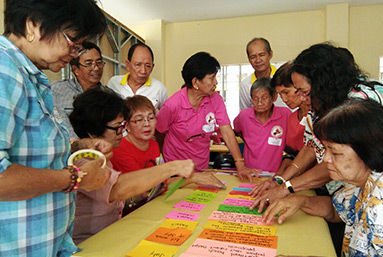Community leaders are often informal, non-elected, leaders who can persuade and influence other community members. Despite the lack of formal appointment, these individuals often play an important role in grassroots innovations and addressing the needs of other community members due to their networks, experience, and trust of community members.
In trying times, they can rise to the occasion to inspire and unite community members to develop resilience against threats they may face. However, community leaders often face challenges and need to be empowered to obtain resources.
- Organize regular events to appreciate community leaders for their contributions. For example, participatory events where community members express their appreciation for these leaders through personal messages and gifts, or award ceremonies to highlight the stories and positive contributions of these leaders on the community.
- Appoint informal leaders as ‘consultants’ or experts in non-governmental or governmental organizations and explore providing them with an honorarium for their contributions. The conferment of titles and awards play an important role in garnering legitimacy which help them to acquire more resources to accomplish their goals and motivation to carry on.
- Establish cross-sector mentorship opportunities, wherein experts in several fields can impart their expertise and knowledge with community leaders wanting to hone skills to aid in their leadership.
- Conduct leadership networks or working groups, where community leaders can contribute and mentor other community members, see Case Study 2.6.a.

To help traditional business survive in the increasingly gentrified Chinatown, a network was set up to connect these business owners with resources. The network showcases successful heritage business owners and encourages them to mentor other traditional business owners, towards greater resilience of the business community against gentrification.
For example, the owner of one of Singapore's oldest Cantonese pastry shops that has successfully modernised its brand and retail shop and retained traditional practices and customers but successfully garnered new markets from the younger generations.
- Conduct trainings wherein community leaders are oriented on policies and bureaucratic processes to advocate and obtain resources from governmental or non-governmental agencies, so that they can better plan and implement community programs, see Case Study 2.6b and Case Study 2.6c.
- More formal structures can be put in place by local government or NGOs for community leaders to communicate with government agencies and external networks for resources.

The EMPOWER program in Whampoa, Singapore focuses on developing community leaders or ‘Champions’ among older persons. A core component of the program is training champions to identify community issues and resources required to initiate community solutions. It then connects them with the necessary local authorities and help them navigate the system to obtain resources. For example, working with the local transport authorities and providers to co-design a community shuttle, see case study 3.5d, which resulted in greater collective efficacy among community members.

In the Bulacan province of Philippines, older persons identified as community leaders were trained by COSE on policy knowledge and advocacy skills, as part of the older persons’ led disaster risk management program. The training oriented them to the basic processes of making policies –who and what influences the making of policies, who holds the decision-making power, and the process of budget allocation and approval. The training increased the competency of these to navigate resources with government agencies as well as confidence in asserting their rights and needs for their disaster risk management programs.
These good practices focus on recognizing, mentoring, and training community leaders, towards encouraging more aspiring community members to step up and increasing the availability of community leaders (C11). They also focus on enhancing the Problem-solving skills (IC8), Information Literacy (IC9) and social capital of leaders, such that they can be more competent in accessing external resources from government or non-governmental agencies, addressing shared needs, towards greater community resilience.

from javascript
from javascript